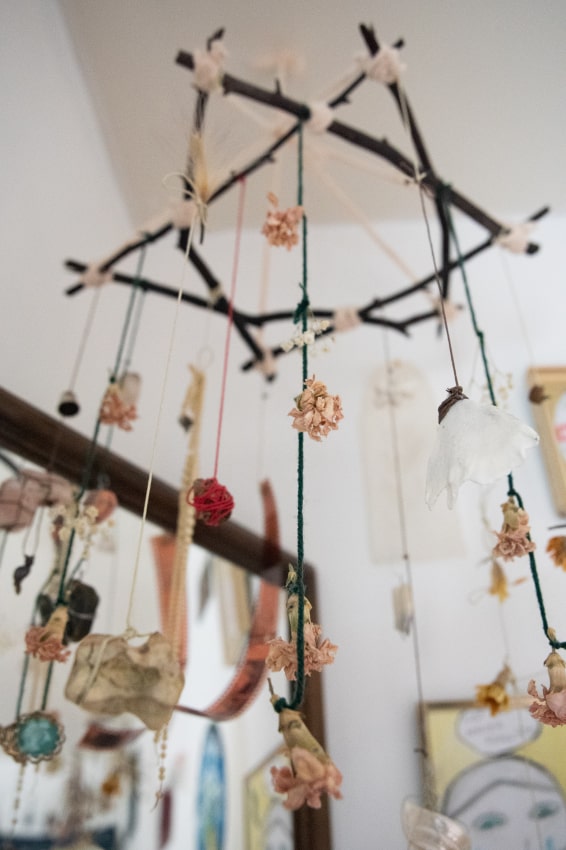
The coffee brews in a french press as we watch the cats playing on the carpet. Plants line the window sill and a dead wasp lies still in a vial on the kitchen table beside a basil plant. A seemingly normal home with a whisper of wonder.
Twenty-three-year-old witch Jo* lights a scented candle and sprinkles rosemary around the flame for protection. It was not too long ago when Jo came to self-identify as a witch, and as a new explorer of the occult, she understands the myths and misconceptions of witchcraft.
The enchanting world of magic seems to exist only in movies and books — a fantasy to help us escape from reality. However, I’ve come to learn that the world of magic is much closer than it appears. There’s a whole community of witches in Saskatoon.
“I’ve actually gotten involved with the community — which I think a lot of people don’t even realize exists… There’s a lot of us,” said Jo.
Since the mundane world gains its knowledge about the craft from entertainment, it is important to look outside those preconceived judgements and conclusions we’ve formed.
The craft is not at all like we see in the movies, but rather it is more so an in-depth spiritual belief similar to religions.
Jo explained to me that her spirituality is about “learning to trust yourself and your inner teacher because we all have intuition.” She went on to say that “because we’re all human, we can tap into this universal energy, which is what I think magic is.”
Witch is a gender-neutral term that Jo uses to identify herself, along with many other practitioners whether they be female, male or gender nonconforming.
Jo believes that magic is more about a connection to nature and “the oneness of everything.” It’s about being more aware and paying more attention to the world. Jo and many witches agree on this, but there’s a lot of diversity in practice and beliefs, too.
“There’s such a wide array,” Jo remarked. “Even among [the Saskatoon witch community], what we consider ourselves — we’re all under the umbrella of pagan — we do have different ways of viewing things, and sometimes we agree and sometimes we don’t.”
Pagan beliefs can be polytheistic, meaning they have many gods, or pantheistic nature devotion, meaning that they believe that god is the all-encompassing universe. While some people follow specific traditions under pagan teachings, others simply follow their gut.
Wicca is a relatively new religion that falls under the paganism belief. Its followers are called Wiccans and are also referred to as witches. However, not all witches are Wiccans.
“Not every witch considers themselves Wiccan,” Jo clarified. “Some people, and especially people who have turned away from other organized religions, don’t like to label themselves.”
Religion and witchcraft are not mutually exclusive — anybody can practice the craft. While that may seem blasphemous for some, witchcraft is a lot more commonplace than one would think.
Witchcraft is not conducted in dark chambers over a cauldron of green potions, but rather a day-to-day practice of spirituality which can range anywhere from putting crystals on one’s window sill to be charged by the moonlight to cooking with intention and energy.
Unfortunately, most people don’t know this and think witchcraft consists of far more extreme practices like hexes, taking away people’s free will, black magic, and of course, Satan.
When Jo spoke about the misconceptions regarding magic and witchcraft, she gave the example of Harry Potter and explained that although it is a fantasy, it’s how people see magic. Jo says, “It’s very black and white — it’s like you’re a good witch or a bad witch,” whereas in the real world, there’s a grey area.
Jo does not believe in people hexing others. To this modern-day witch, it’s inappropriate to cast a spell for someone without their consent.
“I would never do spells for anyone that wasn’t willing,” Jo said. “I might have intentions in the morning if I’m thinking about my family or my friends, sending them good vibes.”
She noted that many witches and the Wiccan religion is against the idea of taking someone’s free will. Wiccans have a creed that essentially states that as long as you’re not doing harm to another, do as you will.
Even in movies like Hocus Pocus, there is the false association of witchcraft with Satanism. In the movie, as the three witches are out on Halloween and see a man dressed as Satan, they immediately fall to their knees in front of their so-called “master.” This was hilarious, but the idea that Satanism equals witchcraft is untrue.
If you’re one of those people who find themselves resonating with witchcraft — whether it’s studying the stars or cooking up a spell, Saskatoon has a few stores with resources. Jo recommended Atlantis 2000 and Nocturnis Art & Metaphysical. There are also countless resources online and so many books that you can find in libraries.
Obviously there are skeptics because much of magic is based off intuition and your belief in yourself. While Jo is just coming out of the broom closet and is still new to the life long journey of being a witch, she is strong in her faith regardless of what others think.
In a personal example, Jo shares that in the passing of her grandfather, she saw a moth that she strongly felt was him. In a teaching, she learned that seeing a moth on a significant day was a symbol of a family member coming to visit.
“I just knew. Nobody gets to tell me that that’s not true, you can go ahead, but it’s not going to affect me and what I’ve lived through.”
*To respect the privacy of the individual interviewed, their name has been changed.
—
Aqsa Hussain/ Layout Manager
Photo: Victoria Becker/ Photo Editor
Leave a Reply